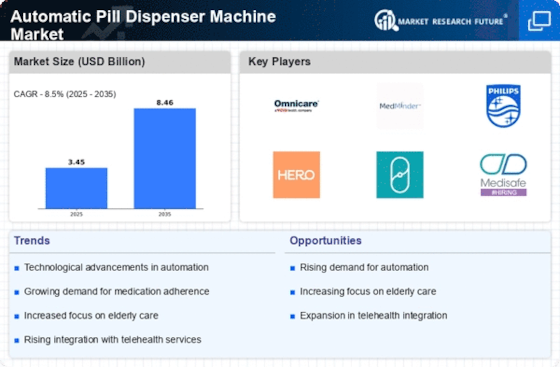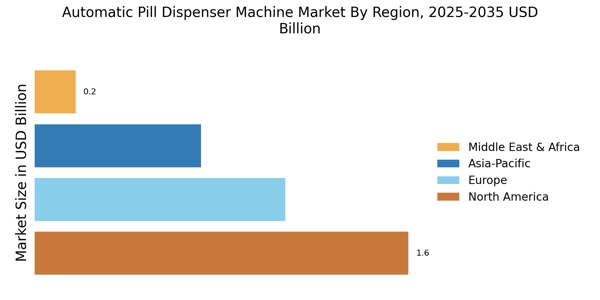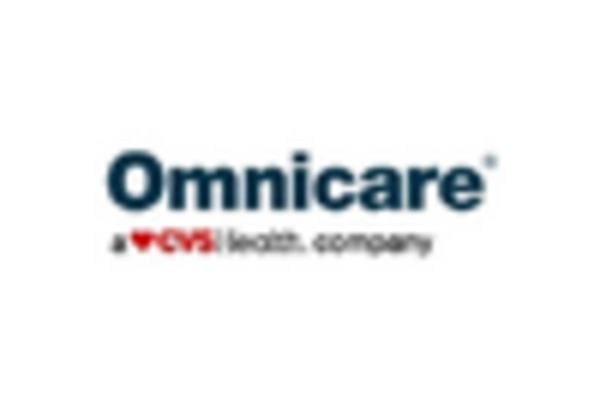Rising Chronic Diseases
The prevalence of chronic diseases is a major driver for the Automatic Pill Dispenser Machine Market. With an increasing number of individuals diagnosed with conditions such as diabetes, hypertension, and cardiovascular diseases, the demand for effective medication management solutions is on the rise. Statistics indicate that chronic diseases account for a substantial portion of healthcare expenditures, prompting healthcare providers to seek innovative solutions. Automatic pill dispensers can help patients adhere to complex medication regimens, thereby improving health outcomes and reducing hospital readmissions. This trend suggests that the Automatic Pill Dispenser Machine Market will continue to grow as healthcare systems prioritize chronic disease management.
Technological Advancements
The Automatic Pill Dispenser Machine Market is experiencing a surge in demand due to rapid technological advancements. Innovations in automation, artificial intelligence, and IoT integration are enhancing the functionality of these devices. For instance, smart dispensers now offer features such as real-time monitoring, alerts for missed doses, and remote access for caregivers. This technological evolution not only improves medication management but also increases user engagement. According to recent data, the market for smart health devices is projected to grow significantly, with the automatic pill dispensers being a key segment. As technology continues to evolve, the Automatic Pill Dispenser Machine Market is likely to expand, driven by the need for more efficient healthcare solutions.
Healthcare Cost Containment
Cost containment in healthcare is increasingly influencing the Automatic Pill Dispenser Machine Market. As healthcare costs continue to rise, providers are seeking solutions that enhance efficiency and reduce expenditures. Automatic pill dispensers can help lower costs by improving medication adherence, which in turn reduces hospital readmissions and associated healthcare expenses. The potential for these devices to streamline medication management processes makes them an appealing investment for healthcare facilities. As organizations strive to balance quality care with cost efficiency, the Automatic Pill Dispenser Machine Market is expected to benefit from this trend, indicating a promising future.
Growing Geriatric Population
The aging population is a critical factor driving the Automatic Pill Dispenser Machine Market. As the number of elderly individuals increases, so does the need for effective medication management solutions. Older adults often face challenges in adhering to complex medication schedules, making automatic dispensers an attractive option. Data suggests that the geriatric population is projected to grow significantly in the coming years, leading to a higher demand for healthcare services and products tailored to their needs. This demographic shift indicates that the Automatic Pill Dispenser Machine Market will likely expand as more elderly individuals seek assistance in managing their medications.
Increased Focus on Patient Safety
Patient safety has become a paramount concern in healthcare, significantly influencing the Automatic Pill Dispenser Machine Market. Medication errors can lead to severe health complications, prompting healthcare providers to adopt technologies that minimize these risks. Automatic pill dispensers are designed to ensure accurate dosing and timely administration of medications, thereby enhancing patient safety. The market is witnessing a shift towards solutions that not only improve adherence but also reduce the likelihood of errors. As healthcare organizations increasingly prioritize patient safety, the demand for automatic dispensers is expected to rise, indicating a positive outlook for the Automatic Pill Dispenser Machine Market.


















